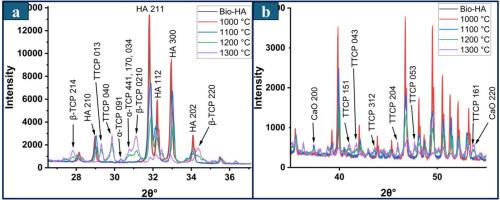Comprehensive investigation into thermal stability of AB-type bio- carbonate hydroxyapatite synthesized via heat-treated bovine bone
IF 2.8
Q1 MATERIALS SCIENCE, CERAMICS
引用次数: 0
Abstract
This study investigates the thermal stability and structural changes of AB-type carbonate-hydroxyapatite (AB-type CHA) prepared from heat-treated bovine bone occurring during calcination at 1000, 1100, 1200, and 1300 °C. The structural phase changes and morphological properties of the calcined AB-type CHA samples were assessed by SEM/EDX, XRD, FTIR, and Raman spectroscopy. The findings highlighted that the decomposition of AB-type CHA undergoes three stages: Dehydroxylation, formation of A-type carbonate-hydroxyapatite (A-type CHA), and decomposition. Pure AB-type CHA was stable in a vacuum atmosphere, and no decomposition occurred at temperatures up to 1000 °C. Dehydroxylation and formation of A-type CHA occurred at 1100 °C. The AB-type CHA partially decomposed at a temperature of 1200 °C. A-type CHA, tricalcium phosphate (α-TCP), and tetracalcium phosphate (TTCP) were the main products of the decomposition reactions, and tricalcium phosphate (β-TCP) was also detected in the system. After sintering at 1300 °C, the AB-type CHA was completely decomposed and converted into α-TCP, β-TCP, and TTCP.

通过热处理牛骨合成的 AB 型生物碳酸盐羟基磷灰石热稳定性的综合研究
本研究探讨了在 1000、1100、1200 和 1300 °C 煅烧过程中从热处理牛骨制备的 AB 型碳酸盐羟基磷灰石(AB 型 CHA)的热稳定性和结构变化。煅烧后的 AB 型 CHA 样品的结构相变化和形态特性由 SEM/EDX、XRD、傅立叶变换红外光谱和拉曼光谱进行评估。研究结果表明,AB 型 CHA 的分解经历了三个阶段:脱羟基、形成 A 型碳酸盐-羟基磷灰石(A 型 CHA)和分解。纯 AB 型 CHA 在真空环境中稳定,在高达 1000 °C 的温度下不会发生分解。在 1100 °C 时发生脱羟基反应并形成 A 型 CHA。AB 型 CHA 在 1200 °C 的温度下部分分解。A 型 CHA、磷酸三钙(α-TCP)和磷酸四钙(TTCP)是分解反应的主要产物,体系中还检测到磷酸三钙(β-TCP)。在 1300 °C 烧结后,AB 型 CHA 完全分解并转化为 α-TCP、β-TCP 和 TTCP。
本文章由计算机程序翻译,如有差异,请以英文原文为准。
求助全文
约1分钟内获得全文
求助全文
来源期刊

Open Ceramics
Materials Science-Materials Chemistry
CiteScore
4.20
自引率
0.00%
发文量
102
审稿时长
67 days
 求助内容:
求助内容: 应助结果提醒方式:
应助结果提醒方式:


